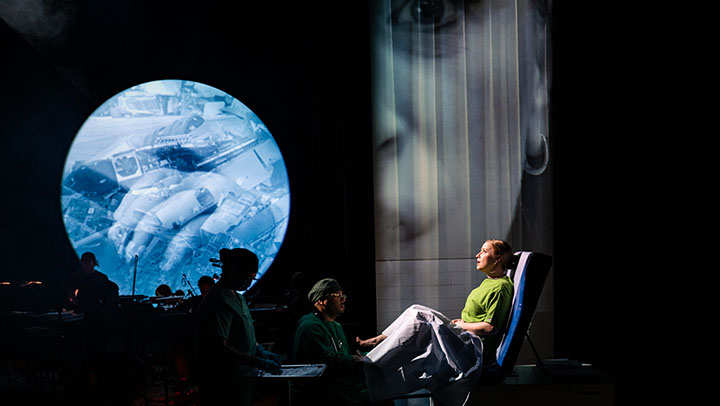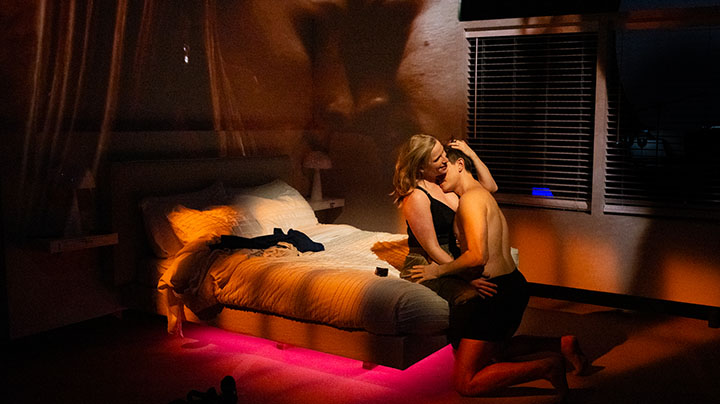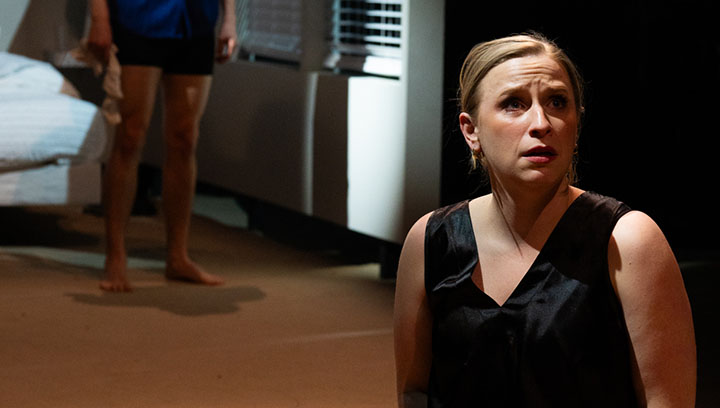In one scene, soprano Katherine Henly, as the archetypally-named “woman,” has her legs in stirrups. “Scoot down a little more,” sings bass-baritone Eliam Ramos, as the “doctor,” in scrubs. “I’ll fall off!” exclaims Henly.
“Relax,” sings Ramos, holding a sinister-looking speculum. Then, the phrase triggering for anyone who has ever had the joy: “You’ll feel a bit of…” begins Ramos. “Pressure?” offers Henly. “Pressure,” he confirms.
Indeed, in The Extinctionist, Heartbeat’s first world premiere (which opened last week and runs until April 14th at the Baruch Performing Arts Center), directed by Shadi Ghaheri, violation is a theme — violation of both the female body and “mother earth.”
Set in the present or near-future —“there is nothing in the libretto that suggests the story does not take place in 2024,” clarifies Schlosberg in the recycled-newsprint program — The Extinctionist traces one woman’s decision whether or not to reproduce.
With the world going to, well, shit, she wonders if she has a moral responsibility not to contribute to its overpopulation and global warming. She looks into getting a hysterectomy and finds the procedure surrounded by red tape.
Musically, The Extinctionist is exceedingly subtle. With Schlosberg conducting animatedly from the piano, the four-piece band played a tintinnabulation-filled score. The musical equivalent of a biological clock ticking.
Throughout, Katherine Fortunato played a “heartbeat” motif on the drum, along with ringing wineglasses and wooden blocks. A particularly striking moment is when Schlosberg simultaneously hits the highest and lowest notes on the piano.
It was left to Suliman Tekalli, on violin and viola, to express the emotions of affection or fury, with an ultra-slow bow in a sex scene. But the most creative feature was an ambient interlude, played by Taylor Levine, featuring electric guitar feedback.
Most of The Extinctionist’s action takes place in what resembles an IKEA showroom, upon which is projected the woman’s doom-scrolling (Kate Noll did the scenic design, with Camilla Tassi the projections). Above the band, a full moon-like circle floats, like a sentry.
The Extinctionist’s libretto often teetered on the darkly funny. Such as when the pregnant “friend,” sung by soprano Claire Leyden, shows up holding a green juice and Hermes bag, the epitome of consumerism.
But throughout the opera, Henley’s chorus of “ha ha’s” become increasingly hysterical. The listener soon realizes she’s, perhaps, an unreliable narrator with dubious motives.
For one, she flips like a switch; “Don’t change my mind once I’ve made up my mind,” is her refrain. For two, she’s not telling her husband, sung by baritone Philip Stoddard, everything.
Stoddard does an admirable job portraying the “man” as at times supportive, at others dismissive. “I want to hold you,” he sings sweetly in his head voice, before joining Henley in an uncannily dissonant duet: “Let’s have a baby.”
Indeed, in the program, Quaid describes the opera as “one woman’s spiral into a kind of eco-madness.” Like a modern-day Lucia di Lammermoor. But is she truly crazy, or is the world just crazy?
In one scene, the listener isn’t sure if Henley is dreaming, or hallucinating, the creepy, mouthless puppet (designed by Afsaneh Aayani) standing in for her potential child.
And at the end, hearing only one side of a doctor’s phone call, we’re not sure if she’s just been told she’s pregnant or infertile.
Though this ambiguity doesn’t fully undermine The Extinctionist’s message about bodily autonomy, it certainly complicates it.
“The sidewalks will be rivers again,” sings Henley in a heartbreaking final aria, “and the airports will be marshes again.” When she gasps, “it’s fine,” we know that’s a lie.
Photos: Russ Rowland






